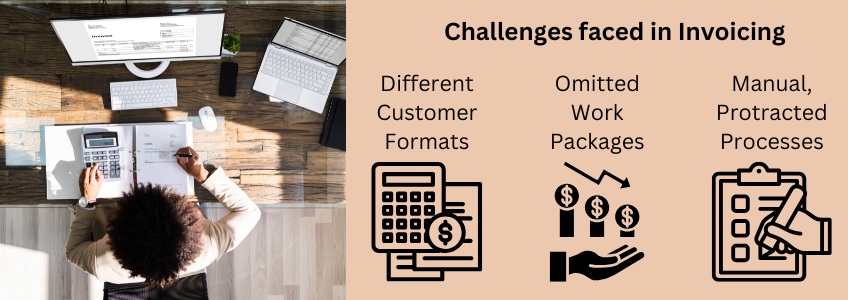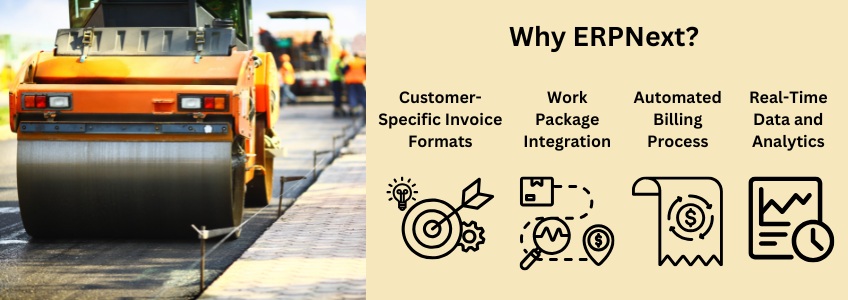How to Set Up Customer-Specific Invoicing in ERPNext: A Success Story of Road Construction Company in the USA
Industry: Construction
Author: Ramanujan KK
Publish Date: 21 February, 2025

Introduction
A leading road development company in the USA was grappling with invoicing inefficiencies, including customer-specific formats and missed work packages. This resulted in billing errors and revenue loss. To tackle these challenges, the company turned to ERPNext, a powerful ERP solution known for its customization capabilities and automation features. By implementing ERPNext, the company simplified its invoicing process, minimized errors, and improved cash flow.
This case study explores how ERPNext transformed this company’s billing operations. It also made invoicing faster, more accurate, and less prone to mistakes.
The Story of the Road Development Company
The company is a well-established road construction business in the USA. They focus on large-scale road development projects for both public and private sector clients. As the company’s project portfolio grew, managing invoicing for diverse customers became increasingly complex. Each client required a different invoice format, and work packages—critical components of the invoice—that were sometimes omitted, leading to billing losses.
Before implementing ERPNext, the invoicing process involved numerous manual steps and checks, which led to errors, inefficiencies, and delays. Given the size and scale of their projects, these issues impacted their bottom line and strained their relationships with clients.
After considering various ERP solutions for construction companies, the company decided to implement ERPNext. ERPNext would help in streamlining their invoicing process and ensure that all work packages were accurately captured in their invoices. ERPNext’s customization options stood out as the ideal solution to meet their unique needs.
The Challenge of Complex, Error-Prone Invoicing

Before adopting ERPNext, the road development company faced several critical challenges.
- Different Customer Formats
Each client had specific invoice format requirements. The finance team had to manually adjust each invoice to meet these demands, increasing the chances of formatting errors. - Omitted Work Packages
A significant issue was the omission of work packages during invoicing. This led to unbilled work and lost revenue. Missing packages impacted the company’s cash flow and led to disputes with customers over invoices. - Manual, Protracted Processes
The invoicing process was mostly manual, requiring coordination between multiple systems and departments. The lack of integration slowed down invoicing, resulting in delays in payment and a longer billing cycle.
The company needed a solution that could automate invoicing, reduce human errors, and ensure all work packages were properly included in every invoice.
How could ERPNext help them?
After evaluating multiple ERP solutions for construction industry billing, the company chose ERPNext for several key reasons.
- Customizability
ERPNext’s ability to tailor invoice formats for each customer was a significant selling point. The company could now automatically generate invoices that adhered to the exact specifications required by each client, reducing the chances of error. - Integration with Work Packages
ERPNext enabled the seamless integration of work packages into the invoicing system, ensuring that no work was left unbilled. This feature played a pivotal role in eliminating revenue leakage. - Automated Billing Cycles
The system’s automation capabilities helped the company speed up the billing cycle, generating invoices promptly after work completion, which improved cash flow. - User-Friendly Interface
The intuitive user interface of ERPNext made it easy for the finance team to adopt the system without extensive training, enabling them to quickly implement the solution across the company.
ERPNext was chosen primarily for its ability to handle complex invoicing workflows and its capacity for customization to meet the unique needs of each customer.
Why the Road Development Company Used ERPNext

The company customized the system to address its specific invoicing requirements after ERPNext was implemented,
- Customer-Specific Invoice Formats:
ERPNext allowed the company to create tailored invoice templates for each customer, automating the process of invoice generation while ensuring format accuracy. - Work Package Integration:
ERPNext’s work package tracking was integrated into the invoicing system, ensuring that no work package was missed during the billing process. This integration helped the company capture all completed work and avoid billing loss. - Automated Billing Process:
ERPNext automated the entire invoicing process. ERPNext generated corresponding invoice without the need for manual intervention just as the work was completed and approved, reducing the chances of errors. - Real-Time Data and Analytics:
The finance team could access real-time project data to track completed work and ensure that invoices reflected the most up-to-date information. This helped eliminate discrepancies and improved the accuracy of billing.
“ERPNext has drastically improved our invoicing process. The customization and integration with work packages have saved us time, helped us capture every dollar owed, and eliminated errors that previously slowed down our operations.” – Manager: Finance and Accounts.
The Results
After implementing ERPNext, the company saw significant improvements in their invoicing process.
- Reduced Invoicing Errors:
Invoicing errors decreased by 80%, as the system automatically generated invoices in the correct format and included all work packages. This led to fewer discrepancies and billing disputes. - Faster Billing Cycles:
The time required to generate invoices decreased from days to hours. Automated billing processes reduced delays, leading to faster invoicing and improved cash flow. - Prevention of Billing Losses:
ERPNext ensured that all work packages were included in invoices, preventing lost revenue due to missed work. The company achieved 100% accuracy in billing all completed work. - Improved Customer Relationships:
The company’s customer relationships improved with accurate, on-time invoices. Clients appreciated the streamlined and error-free billing process, contributing to stronger customer satisfaction and trust. - Increased Operational Efficiency:
The company reported a 25% increase in operational efficiency in the finance department. With less manual work and fewer errors, the team could focus on higher-value tasks.
Conclusion
Therefore, the implementation of ERPNext proved to be a game-changer for this road construction development company. The tangible results include an 80% reduction in invoicing errors, faster billing cycles, and a 25% increase in operational efficiency. These statistics demonstrate the power of ERPNext in transforming a critical business function.
This case study underscores how ERPNext, can provide a comprehensive solution for construction companies seeking to optimize their invoicing processes and drive business growth. It serves as a compelling example of how technology can be leveraged to overcome operational hurdles. It also depicts how ERPNext helps to achieve significant improvements in efficiency, accuracy, and customer satisfaction within the demanding road construction industry.
If you are interested to achieve similar success stories, write to us!
